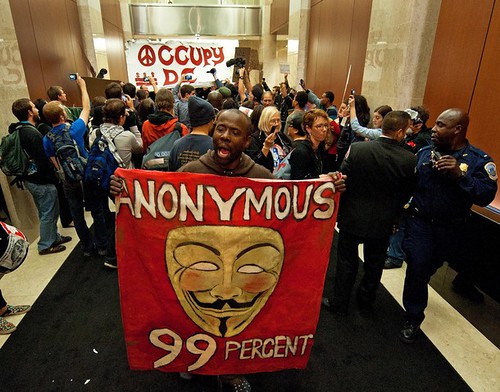I can't claim to be an expert in student or urban unrest. I did go to college a few years after the end of the 1960s, I say this because what we think of as "the Sixties" was really from about 1964 to 1974, when the U.S. military finally left Vietnam.
I went to college in the late 1970s in Ann Arbor, Michigan, which along with cities like Berkeley and Madison, Wisconsin, was a hotbed of the college protest movement. And those experiences and memories were very much fresh within the extended university community.
Over the past almost 25 years in the city, I have been surprised by the general quiescence of the population, and the decreased coverage of protest, press conferences, and the like in local and national media. Although DC is still a hotbed for national protest events, because of the presence of the national government, and the locus of the National Mall as the place to demonstrate.
Today's negative reaction from traditional institutions to the Occupy Wall Street movement, including commentary by the editorial pages of newspapers, is to be expected. Challenge to the system is not to be countenanced, despite the nation's substantive problems:
- massive business failure
- massive unemployment
- inability of the elected leadership to address major national problems
- income inequality and the increased capture of wealth by the 1%
- the economic failure of the sprawl development paradigm
- the dependence of the US economy on military spending
- crony capitalism and the business of financial engineering
etc.
The Occupy movement isn't an endpoint necessarily, and the people involved aren't the ones who are supposed to have a complete, thorough agenda. It's a process, that like the Arab Spring, takes time to play out.
I found how the Occupy Wall Street movement took the time to protest at the DC outpost of Brookfield Office Properties very interesting, and it made me think about the documentary
The War at Home, about the anti-war movement in Madison, Wisconsin, home to the University of Wisconsin.
This movement has a ways to go before it plays out.
 Protesters from Occupy DC, crash into the lobby of the Victor Building at 750 9th Street in Washington DC late November 15, 2011 as they march thru the streets of Washington, DC. The building is home to Brookfield Office Properties, the private company that owns Zuccotti Park in New York where fellow protesters have been camping as they protest Occupy Wall Street. The crowd charged in, made their presence known, and left shortly without incident.. AFP Photo/Paul J. Richards.
Protesters from Occupy DC, crash into the lobby of the Victor Building at 750 9th Street in Washington DC late November 15, 2011 as they march thru the streets of Washington, DC. The building is home to Brookfield Office Properties, the private company that owns Zuccotti Park in New York where fellow protesters have been camping as they protest Occupy Wall Street. The crowd charged in, made their presence known, and left shortly without incident.. AFP Photo/Paul J. Richards.



0 Comments:
Post a Comment
<< Home